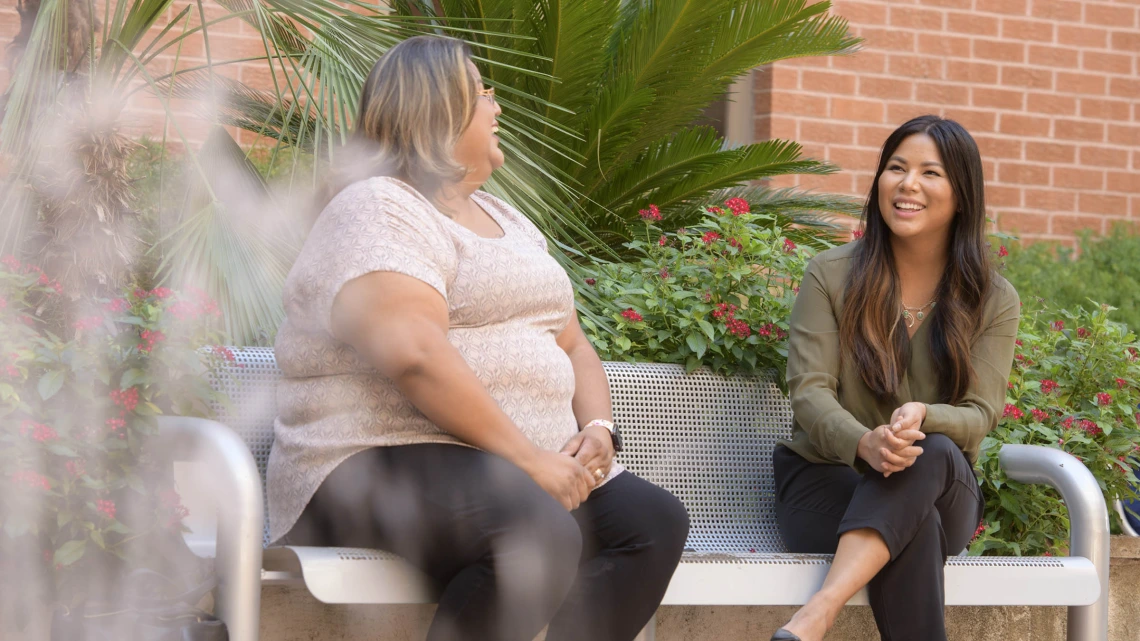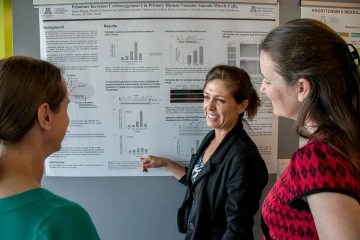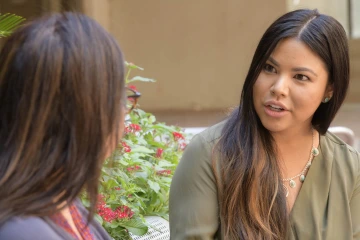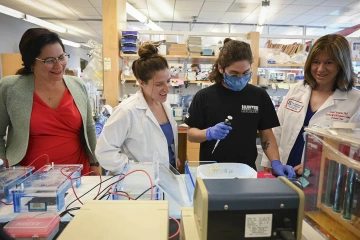Lifting Up Future Health Professionals Through Mentorship
Health Sciences faculty say mentorship clears the path to success and is a ‘two-way street’ between mentors and mentees.

When mentors and mentees build trust and rapport, one can guide the other toward educational and professional success.
No matter where you are on your academic or professional career path, there is always room for mentorship, a relationship in which one person provides guidance and expert advice to help another achieve their goals.
For students early in their academic careers, mentorship can keep them from falling through the cracks and push them to take advantage of resources that can help them grow as learners and leaders. It can help early-career professionals navigate their chosen field.

Dr. Rayna Gonzales (center) says mentorship is essential in getting more women through the pipeline to leadership. Here she is shown with colleagues Karen Hastings, MD, PhD (left), and Taben Hale, PhD (right).
For women at the University of Arizona Health Sciences, mentorship can be one of many effective tools to plug the “leaky pipeline,” the phenomenon in which the number of women decreases higher up into the organizational leadership, from junior faculty to department- or dean-level roles.
“It’s challenging for women in science and medicine to move up the academic ranks,” said Rayna Gonzales, PhD, associate professor of basic medical sciences at the University of Arizona College of Medicine – Phoenix. “Forming a solid network of mentors is key when navigating various barriers that one can experience during the climb up the academic ladder.”
Benefiting from mentors
As an undergraduate student, Timian Godfrey, DNP, APRN, FNP-BC, CPH, clinical assistant professor at the UArizona College of Nursing, worked nights as a certified nursing assistant while taking a full load of classes by day. The director of her university’s multicultural center saw she was spreading herself too thin and her grades were suffering. She took Dr. Godfrey under her wing, setting up regular meetings and sharing information about resources — from scholarships to the campus food pantry — helping ease the financial burden so she could concentrate on her studies.
“Intervention and subsequent actions from my mentor served as the catalyst for my getting into the nursing program and graduating with a bachelor’s degree,” Dr. Godfrey said. “I don’t think I could have done that without her.”
“When mentors found me, it opened up doors and provided me opportunities beyond the classroom.”Rayna Gonzales, PhD
Dr. Gonzales, a first-generation college student, also credits mentorship with expanding her horizons beyond her undergraduate years.
“When I navigated my undergrad, I had no idea what it meant to be a researcher,” Dr. Gonzales recalled. “I was taught that you only go to class, sit there, learn what you’re supposed to learn and take the test. When mentors found me, it opened up doors and provided me opportunities beyond the classroom.”
Dr. Gonzales continued to benefit from mentorship into grad school and as a postdoc, when she was encouraged to take on leadership roles, helping her develop skills that weren’t explicitly taught in the classroom. She says those mentors were foundational to her success.
“When I started as an assistant professor, I gave a lecture to a group of students. On my first slide, I made a pyramid by listing all my academic mentors along the way,” Dr. Gonzales recalled. “When one reflects back on the pyramid of mentors, it’s impressive the amount of people who have put in the time and dedication it takes to get you to where you’re at in your academic career. For me, the base of my mentor pyramid is solid, and the tip of my pyramid continues to grow.”
Role reversal
Those who benefit from mentorship earlier in their careers are often eager to provide the same support and guidance to others. For example, Dr. Godfrey is heavily involved in promoting mentorship within the College of Nursing.
“Mentorship sparked the confidence I needed to succeed. I hope to extend that to other students now that I’m a faculty member,” Dr. Godfrey said. “If you believe that women have a voice equal to male counterparts within health care and science, then there’s no denying the power of mentorship. If that is our ethos as women in health sciences, then we have to pay it forward.”

Dr. Timian Godfrey says she wouldn’t be where she is without mentorship, and hopes to provide the same support for today’s generation of students.
“This is a huge university and it can be really intimidating. Simply knowing you have someone there who won’t let you lose your way can make a world of difference,” Dr. Godfrey said. “If you don’t have a mentor to guide you, the obstacles can swallow you up. Mentorship is that ladder to overcome those obstacles.”
Dr. Godfrey oversees the Indians in Nursing: Career Advancement & Transitions Scholars (INCATS) program, which prepares Native American nursing graduates to provide care to tribal communities, as well as Arizona Nursing Inclusive Excellence (ANIE), which leverages mentorship to increase diversity in nursing.
“Students who wouldn’t have ever dreamed to get a degree from the University of Arizona College of Nursing are now out there making a tremendous impact as nurses, all because these mentoring structures were in place for them,” Dr. Godfrey said. “It’s a beautiful thing to see women support women and celebrate each other in our successes, because it can be competitive in academia.”
Getting the most out of mentorship
Having benefited directly from strong mentorship, many former mentees are happy to find themselves on the other side of the table, helping to nurture and support others. They say certain traits are important for mentees to embrace.
Nancy K. Sweitzer, MD, PhD, director of the Sarver Heart Center and division chief of cardiology at the UArizona College of Medicine – Tucson, says being a mentor is one of the most rewarding aspects of her career, but emphasized the concept of reciprocity.

Drs. Nancy Sweitzer (far left) and Carol Gregorio (far right) say providing mentorship is one of the bright spots of their careers.
Dr. Godfrey says being open to what her mentors shared set her up for success. She listened when she was told about scholarships, advanced degree programs and other opportunities, and applied even when she thought there was no way she’d get them.
“Mentoring has given me my success, the awards that I’ve had, the papers I’ve been able to publish. Everything has been because of someone else,” Dr. Godfrey said. “Surround yourself with strong women, because they will always be lifting you up.”
When the time comes to give back, faculty are encouraged to incorporate mentorship into their routines.
“It’s part of our job, and if mentoring is done right it is truly rewarding from both the mentee and mentor perspective,” said Carol Gregorio, PhD, co-director of the Sarver Heart Center and department head of cellular and molecular medicine at the College of Medicine – Tucson, who co-mentors MD/PhD students along with Dr. Sweitzer. “If we do it right, we all benefit.”
Acting as a mentor also adds variety to a faculty member’s day-to-day duties and can expose them to new ways of thinking about their science.
“I’m not the type of educator who feels comfortable lecturing in front of 500 trainees,” said Dr. Gregorio, who also is a member of the BIO5 Institute and assistant vice provost for Global Health Sciences. She said that the one-on-one relationships she develops with her mentees are central to her mission as an educator. “Mentorship is how we grow. It’s how we get new ideas. It’s how we better our environment and make a difference. It’s not only what we’re giving, we are also benefiting from being good mentors.”
Dr. Sweitzer agrees that the collaborative nature of mentorship is its greatest appeal.
“When you get to a certain point in your career, your legacy is going to be those you helped, who are always smarter and more talented than you are. Science is super fun and I love it, but I really love helping others with their career development,” Dr. Sweitzer said. “It’s the No. 1 pleasure in my job.”
Students and faculty across the University of Arizona Health Sciences campus can receive mentorship from a variety of sources, including those featured in the list below.
University of Arizona Health Sciences
- Arizona Health Opportunities Pathways to Excellence (AZ-HOPE): The Health Sciences Office of Equity, Diversity and Inclusion offers numerous programs for high school and college students, which feature mentorship and service learning as central components
College of Medicine – Phoenix
- Career and Professional Advising: Medical students are assigned advisers, who work with them over the course of their educational journeys to help them find their passions, build networks and find mentorship
- Student Interest Groups: Medical specialties have their own interest groups where students can network with mentors and local physicians
- Research Office for Medical Education (ROME): This office assists faculty, staff and students interested in pursuing medical education with mentors, hypothesis development, IRB approvals, data gathering, access to biostatistical assistance and manuscript writing
- Women in Medicine and Science (WIMS): WIMS provides their campus community with networking, professional development and mentorship
- LIFT Faculty Peer Mentoring Program: A nine-month cohort-based peer-mentoring program for faculty career advancement
College of Medicine – Tucson
- National Summer Undergraduate Research Project (NSURP): NSURP connects BIPOC and Latinx undergraduate students across the country to remote summer internships in the microbial sciences and computational immunology
- Societies Mentors: Medical students meet one-on-one with career advisers who guide them toward choosing a specialty
- Medical Scientist Training Program (MSTP): Dual MD/PhD students are paired with basic science and clinical mentors who prepare them for careers as physician-scientists
- Women in Academic Medicine (WAM): WAM offers mentorship and networking opportunities to students and faculty
- College of Medicine Peer Advancement Societies (COMPAS): Matches small groups of junior faculty with senior faculty facilitators for a peer-mentoring program
College of Nursing
- Arizona Nursing Inclusive Excellence (ANIE): Faculty and peer mentorship for full-time nursing students from underrepresented backgrounds
- Indians in Nursing: Career Advancement & Transitions Scholars (INCATS): Increasing the number of BSN and advanced practice Native American nurses who will practice in tribal facilities
College of Pharmacy
- PharmCat Mentor Database: Pharmacy students seeking mentorship can contact their faculty adviser to access this database, which they can use to search for potential mentors; additionally, all PharmD students are assigned a mentor
- PharmD PRIMED Leadership Certificate Program: PharmD students completing this certificate program receive peer mentoring and provide mentorship to undergraduate pharmacy students
College of Public Health
- Public Health Student Alliance (PHSA): Connects students to civic health promotion events, social events, service projects, technical assistance workshops, advocacy training and a peer-mentorship program

